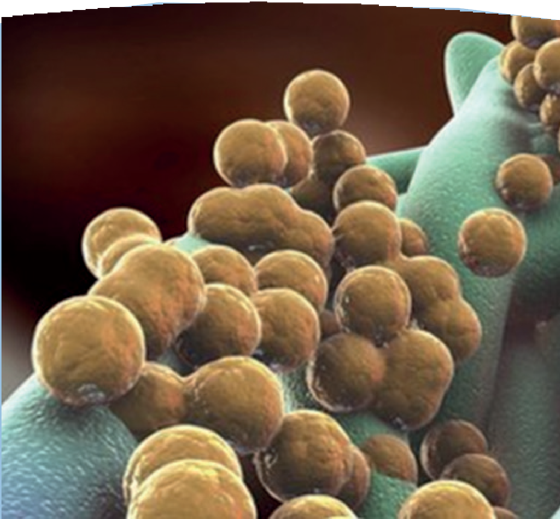Information for patients and visitors
What is MRSA?
MRSA stands for “meticillin resistant staphylococcus aureus”. It is a bacterium which is present in the nostrils and skin of around 30% of healthy people.
MRSA are strains of staphylococcus aureus that are resistant to several antibiotics. MRSA is not new. It was first found in the 1960’s following the widespread use of antibiotics. If the bacteria stay in the nose or on the skin surface they will not cause any harm, if they enter a wound they may cause infection.
How is MRSA detected?
On admission to the hospice a member of the nursing team take swabs from different parts of your body to check if MRSA is present.
How serious is an MRSA infection?
MRSA strains of bacteria are no more aggressive or infectious than other strains of staph-aureus.
However, infections are much more difficult to treat because many antibiotics do not work against MRSA.
People who are prone to MRSA are those who are very ill or have wounds.
Also, urinary catheters and tubes going into veins or other parts of the body can sometimes become contaminated by MRSA and this can lead to urine or blood infections.
MRSA can affect you in two ways, either as a carrier (colonisation) or by an infection.
How does MRSA spread?
MRSA can be transferred by hands (direct contact) or via surfaces and equipment (indirect contact) and through airborne spread. It is difficult to determine how each individual patient acquires MRSA; some patients may carry MRSA on admission therefore nursing staff will apply the principles of standard infection control, by washing hands and wearing of personal protective equipment (gloves and apron).
MRSA colonisation
This is when MRSA grows in or on your body with no signs or symptoms of an infection. Many people carry MRSA without it causing them problems.
The most common place for colonisation is in your nostrils, groin or throat. This colonisation can act as a reservoir which means that MRSA infections can later develop in your body or spread to other people.
If you are colonised with MRSA you will still be able to attend hospice activities and services.
MRSA infection
Patients who have an infection may develop signs and symptoms, such as a high temperature or a fever. An infected wound may become red and sore and discharge pus.
How can MRSA be treated?
The treatment given will depend on where you have MRSA. Your treatment will be explained to you by the nursing staff. The doctors may need to prescribe antibiotics for you. The length of treatment will vary from person to person.
If you are colonised (just carrying MRSA without it causing infection) you will probably be prescribed a special body wash, shampoo and cream for your nose, which is a way of trying to remove and reduce the MRSA from the places where it lives. This is known as decolonisation.
A patient who has an MRSA infection is usually treated with an antibiotic.
How do we care for patients with MRSA?
All MRSA positive patients are risk assessed in line with our MRSA policy. An appropriate plan of care is then developed and shared with you.
You may be transferred to a side room to ensure your treatment is managed correctly and to protect other patients.
How do we stop MRSA spreading?
We take special precautions with patients who have MRSA in order to stop MRSA spreading to others. Staff will:
- carry out regular cleaning, changes of bed linen
- wash their hands and dry them thoroughly before and after patient care
- wear gloves and aprons when they carry out your care and clean your room.
Will MRSA harm my family or friends?
No, unless there is an ongoing illness or disease that is compromising your immune system, someone who may be receiving chemotherapy, the frail, elderly or young. Visitors can reduce the possibility of spreading MRSA to other people if they do not sit on the bed and if they wash their hands or use antimicrobial foam rub when entering and leaving the room. Please do not allow your visitors to sit or lie on your bed.
Will MRSA harm me?
Having MRSA should not affect or comprise your normal daily routine whilst you are a patient or affect your length of stay.
In line with our MRSA risk assessment, patients who are colonised can mix socially within our communal areas such as the Sunflower Centre.
You will be able to go home when your general condition allows, so your length of stay should not be affected. If you require further treatment to clear the MRSA we will ensure that your GP is aware of this.
What happens when you go home?
Having MRSA should not affect your normal daily routine, social life or prevent you from going to work. If you have an open wound this should be kept covered. If you have specific queries when you are at home, these can be discussed with your GP or community nurse.
Can MRSA come back?
MRSA can return after treatment has stopped. If you are admitted into the hospice or hospital again you may be asked to occupy a single room or stay in an isolation ward to await re-screening results. The screening will involve a nose swab, a swab from any wounds and a catheter specimen of urine.

